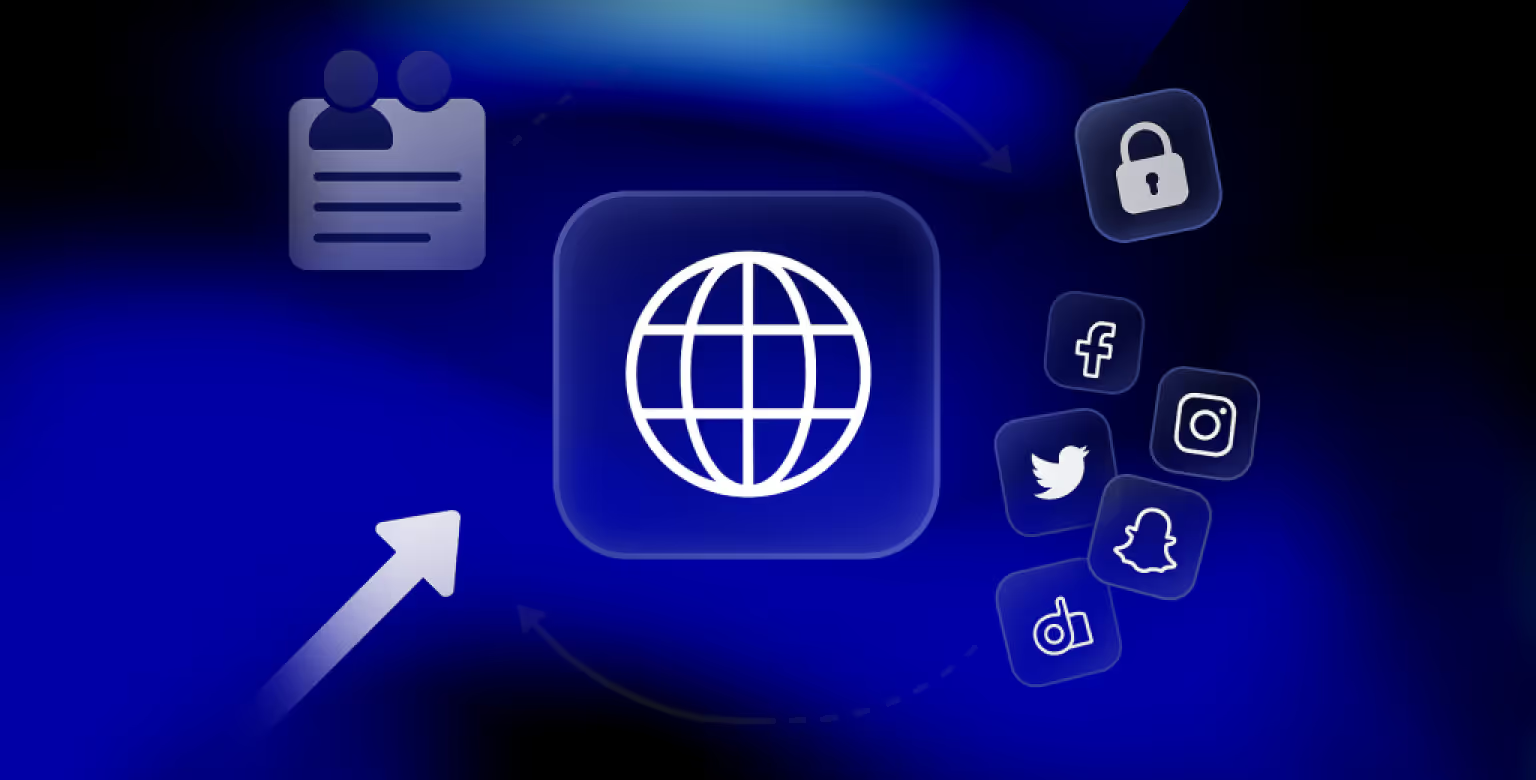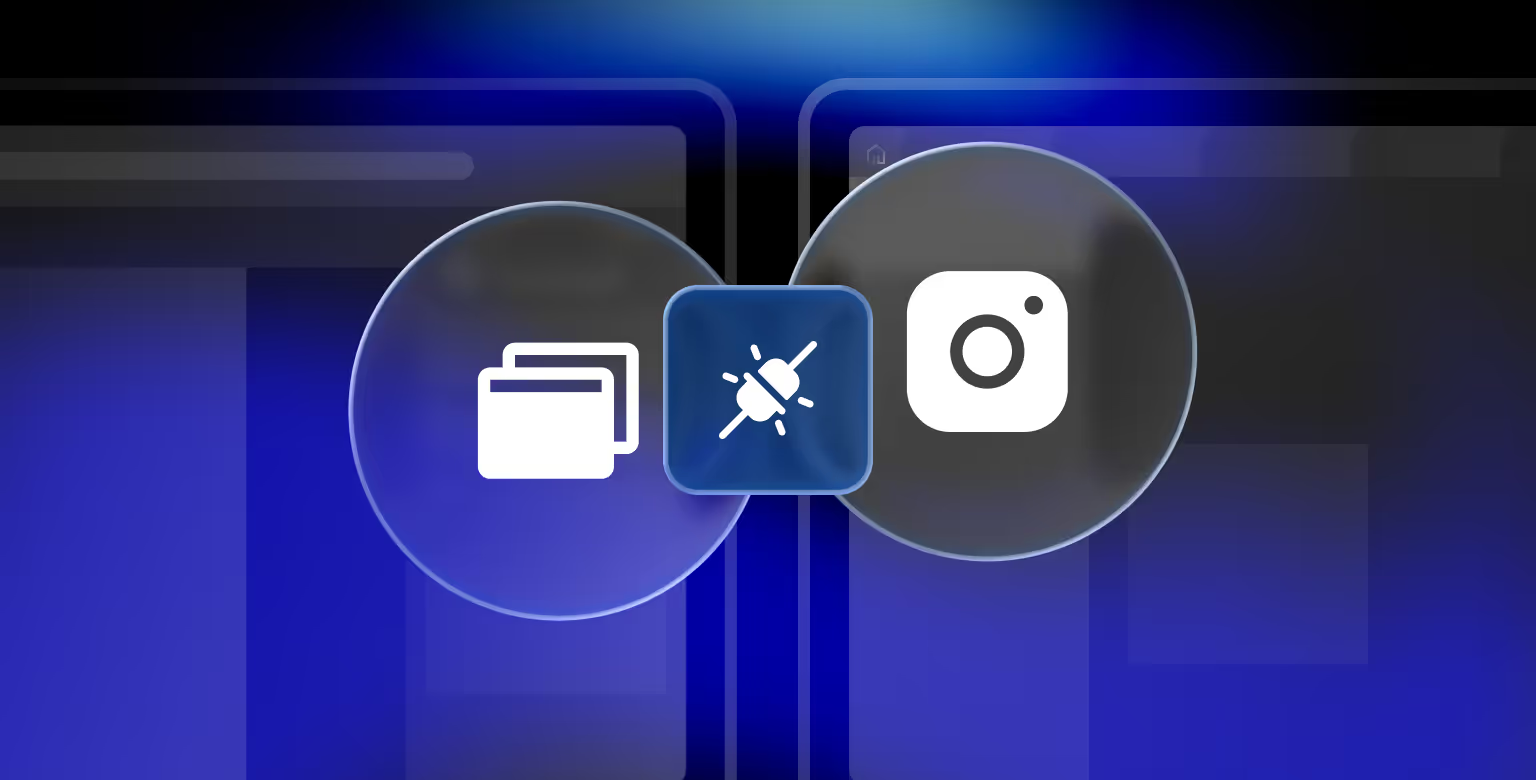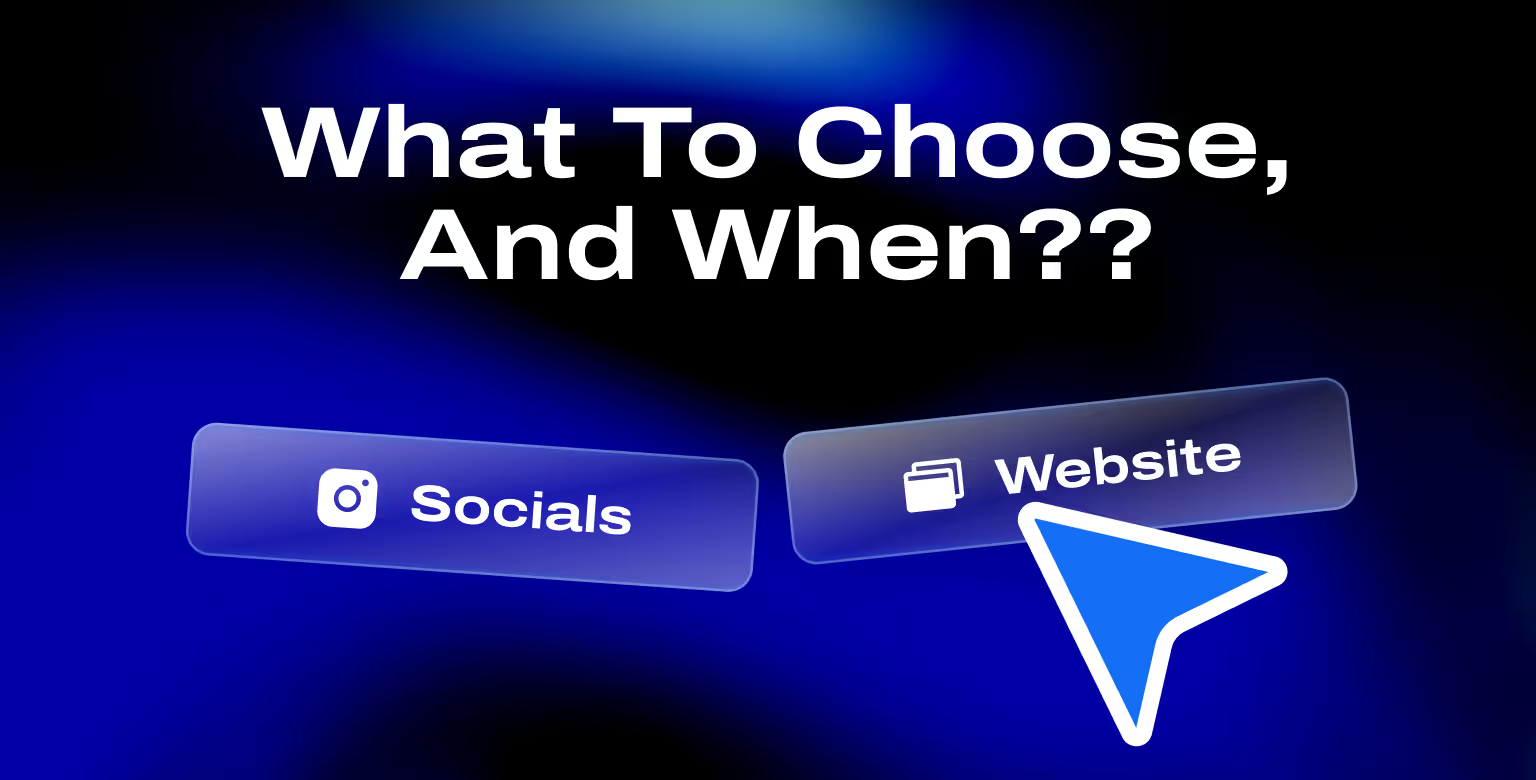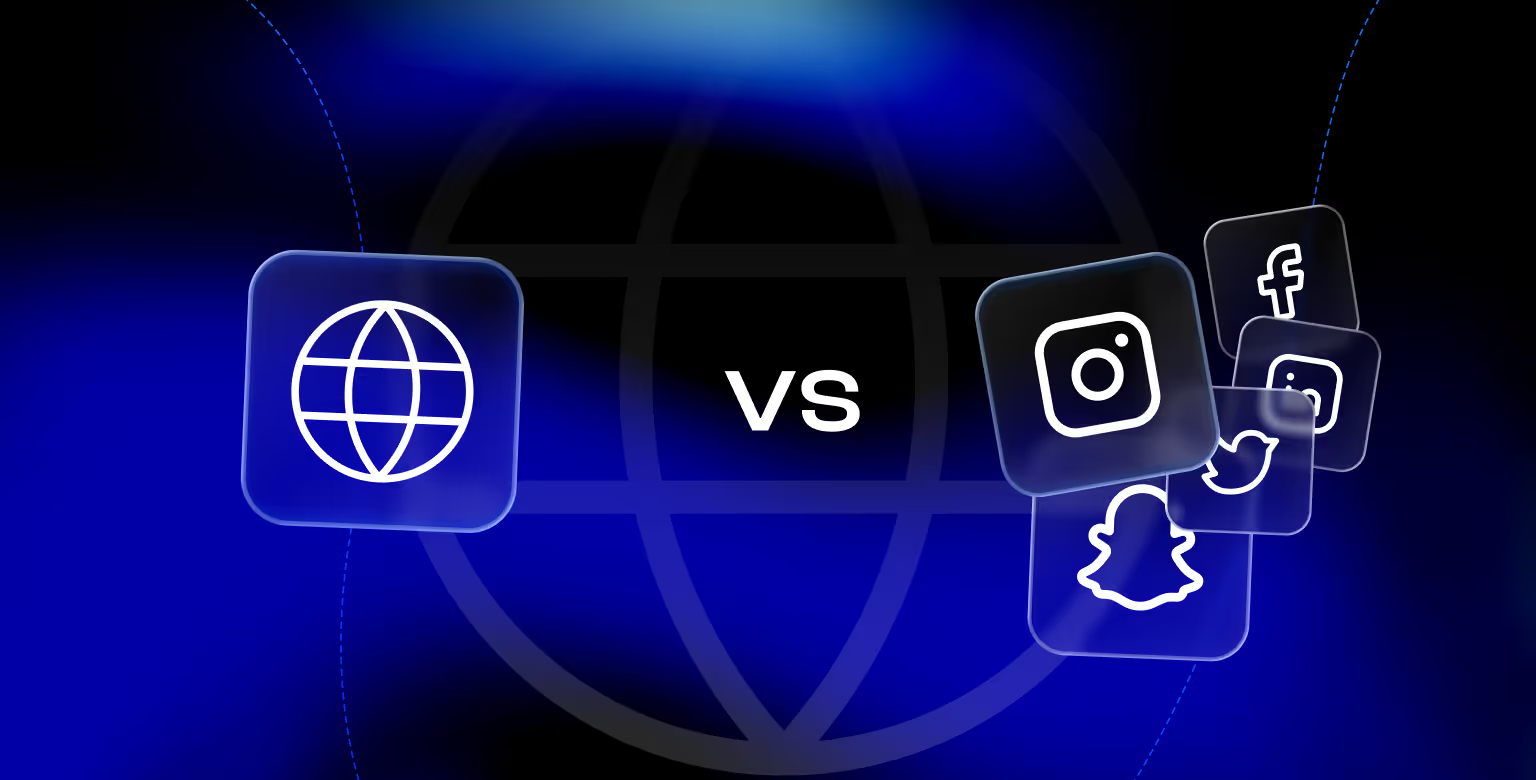Both tools impact your business's credibility, discoverability, and conversions. A website is your owned hub for information and lead capture, while social extends reach and creates real‑time engagement. This article compares strengths, limitations, and when to prioritize each, and shows how to combine them into a unified funnel.
What Is a Website (and What Does It Do for Your Business)?
A website is a digital property that you own and control. It serves the purpose of the HQ of your digital operations, especially on marketing end. As it's connected to your domain name, it's your property that no one can take away from you unlike social media, which belongs to third-party platforms. Being your property, websites are fully customizable, both from the funnel standpoint and from the visual / brand side.
Key Functions of a Website
Depending on the type of website, you'll find it having different functions:
- Showcasing products or services
- Sharing important brand information through pages such as Home, About, etc.
- Answering visitor queries through Contact, and FAQs.
- Publishing articles, case studies, or insights
- Hosting lead generation forms, demo requests, or checkout systems

Professional Online Presence
Being a digital HQ for B2B brands, a website is commonly both the point of conversion and the first touchpoint for your potential clients. A polished and well-structured site makes it easy for the visitors to find what they are looking for, establishes authority, and showcases credibility. By doing so, the site becomes a tool helping the businesses reach it's bottom line. Read our guide to get a better understanding of what is a B2B website and what features make them effective.
Customization and User Experience
Building a website allows you to design the digital architecture of your business. In other words, you can design your offers, funnels, user journey flows, brand, layouts, etc., allowing you to guide visitors through a planned journey. This is a complete opposite when compared to social media platforms, which have limited and predefined user journey that you have no control over.
Your website can also scale with your business needs. If for example you develop new product offering that requires aditional functionality from your site, you have an option to create that functionality, which is not something you can do using social media.
What Is Social Media (as a Business Platform)?
In simple terms, social media platforms are tools that give businesses (and individuals) opportunities to connect with other businesses and individuals. They are as valuable as their user base and are free to join. Some of the bigger platforms such as LinkedIn, Facebook, Instagram, and X (Twitter) typically have millions of global users.
Audience Access and Engagement
Social media is designed for quick interaction and two-way communication. They allow businesses to post content, business updates, and engage with their community through comments in real time. The nature of the tool makes social platforms excellent for top of the funnel content, boosting brand awareness and engagement.
Built-In Limitations
The trade-off is that social media is rented space. The platform dictates the rules, formats, and visibility of your content. Algorithm updates or policy changes can drastically reduce your reach overnight. Branding opportunities are also limited, since every page looks similar and customization options are minimal.
When It Works Best
Social media is used best for initiating conversations, sharing updates, and growing visibility as quickly as possible. That being said, it is not a replacement for a website, as it doesn't give you as much control, credibility, and high conversions rates when compared to what a website can achieve.
Website vs Social Media: Key Differences for Businesses
Ownership and Control
- Websites: You own your domain and content. No one can take it down unless you stop paying for hosting or let your domain expire.
- Social Media: You are subject to platform rules. Accounts can be suspended, content removed, and algorithms can limit visibility.
Customization and Branding
- Websites: Unlimited design control from navigation to branding, the experience can be tailored to your ideal client profile (ICP).
- Social Media: Limited options for branding, and no control over UI and layouts.
Audience Reach and Visibility
- Websites: Strong for long-term discoverability through SEO and direct traffic. Content can stay relevant for years.
- Social Media: Excellent for immediate reach and viral potential but content has a short life. Based on Social Insider, approximately 3% of a page's followers see an Instagram post, while only 1.2% see a Facebook post.
Credibility and Trust
- Websites: Visitors expect to see detailed information on the brand, it's product offering, case studies, and other proof points. Sites allow those to be presented in a way that's higher in nquality compared to the social media presentation.
- Social Media: Following count, likes, and other types of engagement are trust metrics, although unreliable.

Lead Generation and Conversions
- Websites: Optimized for conversions through tailored CTAs, landing pages (LPs), and integrations with CRMs and analytics. HubSpot shows 5.89% average conversion rate across all industries, which is higher than what's possible using social campaigns.
- Social Media: Converting visitors usually require redirecting users to a website.
To capitalize on the conversion advantage of websites, leveraging conversion rate optimization experts can help your website turn more visitors into customers.
Cost and Effort
- Websites: Higher upfront investment, but long-term ROI through owned traffic and conversions.
- Social Media: Free to start, though growth often requires consistent content creation or paid advertising.
Differences at a Glance
Why Your Business Needs a Website (Key Benefits)
A website is the HQ of your business digital presence. It is designed to attract visitors, inform them, and ultimately convert into customers.
Professionalism and Credibility
An established business is expected to have a dedicated website. It's a matter of professionalism and credibility. A custom domain and a sleek site design communicate just that.
Search Engine Visibility
Unlike social media, websites rank in search engines like google. Search engine visibility means that your site can be found when searching for relevant terms in Search Engines. Because pages rank for relevant keywords, optimized web pages drive evergreen, organic traffic for long time periods from the page launhch date. Keywords signal search intent and guide on-page work, so tracking them along with impressions, CTR, and conversions to catch drops and close gaps is something website work should incorporate. Use keyword rank-tracking tool to automate alerts and tie movements to specific pages and SERP features.
However, search engines now often provide answers directly on the results page, optimizing for Answer Engine Optimization (AEO) helps your brand remain visible in those zero-click scenarios.
Looking to improve your site's performance in the eyes of the search engines? Explore the services of our SEO agency for tech startups.
Conversion Optimization
A website is built to capture leads and sales when the copy, CTAs, and integrations work together. You can test and improve conversion rates over time using data from analytics tools such as microsoft clarity.
Content and Resource Hub
Resource centers are used in websites to build brand and topical authority within the business niche. Those can include, but are not limited to downloadable resources, whitepapers, case studies, blogs, and more. Building a resource hub is the main way to help prospects make informed decisions.
Analytics and Data Ownership
You can get a lot more analytics variety on site compared to that of social media. In example, you can track user flows (where visitors land on site from), what visitors do on-site, and what events lead to conversions. The volume and diversity of data can be used to refine your business strategy and turn your site into a high-converting website.

Why Social Media Matters for Your Business (Key Benefits)
Social media platforms help you connect with your audience and building visibility (short-term). They offer a range of advantages that support brand growth.
Audience Engagement and Community Building
While sites can have a built in commenting feature, social platforms thrive on the features made for building communities and are built for interaction. They provide the best experiences businesses can have when it comes to responding to comments, answering questions, and building relationships in real time.
Brand Awareness and Reach
Social media platforms run on algorithms that help spread your content quickly depending on a set criteria. This is especially valuable as new audiences get to discover your content that may not have discovered you otherwise.
Real-Time Updates and Feedback
Social media is ideal for sharing news, product launches, and updates of any sort. It also provides instant feedback through likes, comments, and direct messages.
Cost-Effective Marketing
Starting a social profile is free, and organic reach is possible with consistent posting in those platforms. There are also paid campaigns that can be used to boost your reach.
Networking Opportunities
Not every platform is ideal for B2B, however, each social media is niched in a way. LinkedIn for example is great for networking with peers, thought leaders, and potential partners. One of the main objectives of using social media for business is to enable conversations dedicated to making business decisions.
Can Social Media Replace a Website?
Since social media is cheaper to run your business on, why not run a business without the website?
Risks of Relying Only on Social Media
- Algorithms are prone to change. Those changes almost always lead to drops in visibility.
- Platforms can suspend, shadow-ban, or permanently ban accounts with no warning, nor reason given. Those actions sometimes cannot be appealed, meaning your income can dissapear overnight.
- Content is difficult to organize and often gets lost in feeds.
- Lack of a custom domain makes your business appear less established and less credible.
Credibility and Customer Expectations
A missing website raises doubts in consumers, particularly in B2B where purchasing decisions require deeper research and majority of conversions occur in front of a desktop during business hours. A lack of website is correlated with a business being scammy.
Why You Need Both
Social media is a must have for reach, engagement, and business visibility. Website is a must have for all the other reasons. Together, they cover different parts of the buyer journey. Social introduces your brand, while your website nurtures and converts visitors.
How to Use Your Website and Social Media Together (Integrated Strategy)
Consistent Branding and Cross-Promotion
Keeping branding consistent across all channels is non-negotiable. It's not the easiest thing to do as different rules apply for socials and web when it comes to branding. Some of the general guidelines include using the same logo, colors, and tone of voice.
When it comes to content, successful marketing brands cross-promote their content, and they often use an all in one marketing solution to streamline their efforts across every platform.
Driving Traffic from Social to Your Website
Use social to distribute teasers of longer content and direct users to your site. Use long-form content to answer their questions as well as you can.
Using Your Website to Capture Leads
Move visitors down the funnel and guide them to either sign up for your newsletter, book a demo, or downloading a resource. Tracking tools like pixels allow retargeting campaigns back on social.
Leveraging Strengths of Each Platform
- Host gated resources or webinars on your website, then promote them via social.
- Share case studies on your site, and post highlights on LinkedIn.
- Use social conversations, market and SEO research to inspire blog content that lives on your site.
Unified Funnel
When combined, websites serve as the conversion hub while social channels build brand awareness and engagement. Using both tools helps prospects encounter your brand at multiple touchpoints throughout their journey. The more touchpoints your ICP has with your brand, the more likely they are to convert.

Website or Social Media First? Where to Prioritize
If resources are limited, which to pursue first becomes a chicken or the egg type of question.
Assessing Business Needs
For new businesses, social media gives a benefit of quick visibility. That said, nothing beats the credibility of being findable on google and other search engines. A basic site can go a long way.
Audience Expectations
Choose the starting point based on the ideal client profile (ICP). B2B buyers in example are more likely to browse using their desktops, meaning they will look for a website with detailed information. While a local bar may get away Instagram presence, that won't be the case for a SaaS company.
Quick Credibility vs Long-Term Growth
Social media can grow awareness, but the website builds long-term stability and acts as the foundation for future growth. Typically, the bigger the site, the more credible it appears.
Resource Allocation
We started with a lean site (started out as three pages) and a LinkedIn profile. Since then, we have grown our site to more than a 100 pages, but have not prioritized social media as much. A good idea is to start using both until you're ready to prioritize. Once you are clear that one channel delivers higher returns on investment (ROI), double down on it. You can calculate your website ROI to make that call.
To maximize your digital presence from the outset, developing a clear B2B website strategy will align your site with business goals and set the stage for sustained growth.

Conclusion: Just Start Building
Websites and social media are not competitors, but partners. A website provides control, credibility, and conversion opportunities. Social media creates engagement, reach, and community.
For B2B businesses, the website is the anchor. It is where prospects research, validate, and convert. Social media is the amplifier, ensuring your brand is discovered and engaged with regularly.
The best strategy is a balanced one. Invest in a professional website as your foundation, and use social media to drive attention and traffic back to it. Together, they create a stronger funnel and ensure consistent growth.
If you are ready to strengthen your online presence, consider investing in both. Tilipman Digital is a B2B web design agency that specializes in building B2B websites and marketing funnels that convert visitors into customers.
Frequently Asked Questions
Do I need a website if my business is active on social media?
Yes. A website provides credibility and control that social media cannot. Social profiles help with engagement, but a website is the foundation for authority and conversions.
Which should I create first, a business website or social media pages?
If possible, launch both. If resources are limited, prioritize a simple website for legitimacy while starting at least one active social profile for visibility. Even an uncomplicated site can establish your presence professionally; see our guide on how to build a business website for a step-by-step approach to getting started quickly
What are the risks of relying only on social media?
Relying solely on social means you are at the mercy of algorithms and policies. Your account can be suspended, your reach limited, and your brand perceived as less credible.
Can a Facebook or LinkedIn page serve as my website?
No. They are not effective at showcasing your brand and leading your visitors down the funnel. They work best as complements to your site, not replacements.
Which is better for lead generation, a website or social media?
Websites are better for capturing and converting leads. Social media is better at creating awareness and traffic. The two work best when integrated, especially as SEO efforts take time to bloom.
Do Gen Z customers still visit websites, or only use social media?
Gen Z spends significant time on social platforms. That said, it is a common belief that credible businesses should have websites. When making serious purchase decisions, they research on company sites for the most accurate information.


